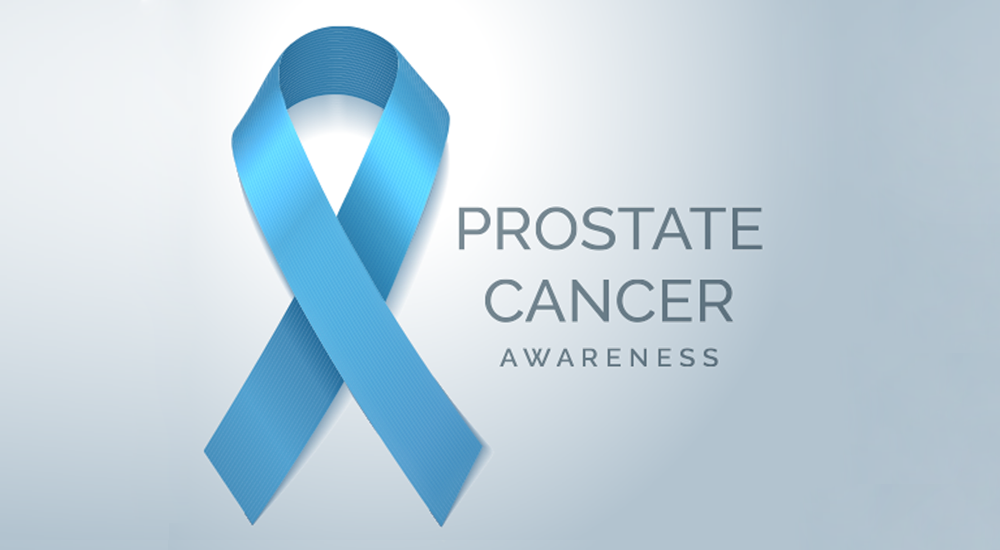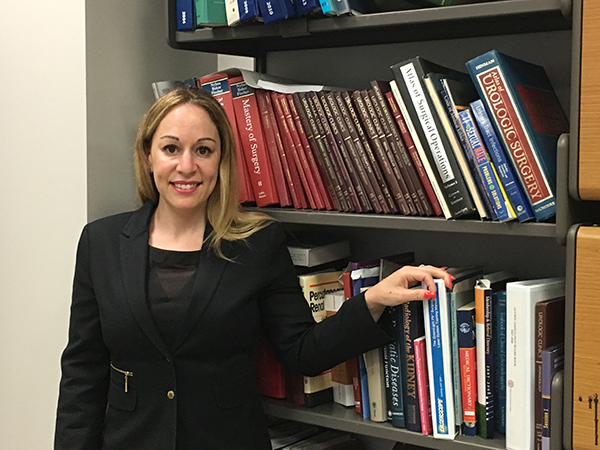While at Northwestern Medical School, Dr. Stacy Loeb learned that her grandfather was diagnosed with prostate cancer. His struggle with the illness inspired her to take on the professional challenge of becoming a clinician and researcher in the field of urology.
She was committed to finding better ways to treat this very common disease for which treatment options often came with difficult side effects. While treatment is usually less traumatic than it was even ten years ago, Dr. Loeb’s research continually looks for even better ways to manage prostate cancer.
Record numbers of Veterans…are opting out of immediate surgery.
Loeb is the daughter of a Navy Veteran and granddaughter of a Veteran who served in the Air Force in WW II.
She is a urologist at VA NY Harbor Healthcare System (Manhattan Campus) and assistant professor in the urology and population health departments at NYU School of Medicine.
She currently splits her time between seeing patients and research for multiple studies. She says she, “loves the combination,” explaining that it allows her to experience in a “full circle way,” the results of each discussion with a patient in the exam room, leading to new research ideas and then bringing the results back to the clinic to help improve patient care. Her time spent in each of these areas can lend itself, in real-time fashion, to immediate results.
All in the VA family
Loeb is proud to be working with VA at the forefront of these studies. Prostate cancer treatment and research are never far from her mind. Her husband, Dr. James Borin, is also a VA New York urologist who directs the robotic urology program for patients pursuing surgical management.
Funded by research grants from the National Institutes of Health, the New York State Department of Health, and the Prostate Cancer Foundation, Loeb and her team are able to advance the research of prostate
cancer. They are specifically studying a recent trend of what is known as “active surveillance” or “watchful waiting,” that reduces the rush to treatment and opts out of immediate surgery or radiation. For men with low-risk prostate cancer, this is a safe option that can preserve the quality of life. Personal goals and quality of life vary greatly from patient to patient and treatment options need to be tailored to these preferences.
Loeb’s research is garnering national attention. Research for which she was a primary investigator was published in the May 15 issue of Journal of the American Medical Association (JAMA). Record numbers of Veterans diagnosed with non-aggressive prostate cancer are heeding the advice of international medical experts and opting out of immediate surgery or radiation to treat their cancer.
Postponing surgery: watchful waiting
Instead, according to a study led by Loeb and her colleagues from the Manhattan campus of the VA NY Harbor Healthcare System, NYU School of Medicine, and its Perlmutter Cancer Center, increasing numbers of these men are electing to postpone additional therapy unless their symptoms worsen — a passive practice called watchful waiting — or they are choosing so-called active surveillance.
This program relies on regular check-ups, including blood tests, physical exams, and the occasional needle sampling of prostate tissue to check for any signs of a tumor getting worse, such as fast growth, before aggressive treatment is considered.
One of the largest studies of its kind, it involved a review of the medical records of 125,083 former servicemen, mostly over the age of 55, who were newly diagnosed with low-risk prostate cancer between 2005 and 2015.
Taking this research to the next step, Loeb and her team are developing a complex mathematical model guide to best practices on the type and frequency of testing to be used during active surveillance. Their hope is that this research can expand the use of active surveillance and help more men with favorable risk prostate cancer avoid unnecessary treatment.
About the author: Stephanie Griffen is a Public Affairs volunteer at the VA NY Harbor Healthcare System. She is a very valued volunteer who has dedicated her time and talents to the Office of Public Affairs for nearly two years.
Topics in this story
More Stories
Study underscores important role COVID vaccination can have in protecting Veterans from infection and reducing long-term health consequences
Columbia VA’s robotic surgery teams completed their 800th robotic surgery and are on schedule to hit 1,000 by the end of the year.
In a decentralized clinical trial, Veterans can participate from their own homes or local VA instead of having to travel to a research site.








Thank you for your service to our nation’s best. Prostate and urinary problems post surgery can be mitigated by certain natural supplements and vitamins as well.
Thank you all for opinions and experiences which will be helpful for me. Most of all, thank you Doctor Loeb for your dedication to us and our wonderful VA. May God continue to Bless you and those you touch. I just wish I could help you.
I had prostate cancer. I also had a PSA of 13.5. I am an African American male whose father have prostate cancer and died (WWII VET) My brother had an enlarged prostate PSA of 12 non cancerous. I chose the seeding and radiation since the csncer cells wete outside of the prostate but not to the bone. My PSA is now .015 and the cancer is in remission. The wait and see method may not have worked nor the surgery sonce the cells were already outside the prostate.
I appreciate the review but surgery had other side effects that i did not wish to deal with at 65
5 years diagnosed non aggressive form prostate cancer. several needle biopsies. on 7mg terazosin and finasteride. upshot is that at 75 yrs old and urinary problems at nite keep me from sound steady sleep. after accepting watchful waiting procedure and completing all volunteer stuff on prostate study at seattle VA. I do wonder if urology is done with me and Im too old for them to do more for me if needed at my age. Am I right?
The only trouble with radiation, once you have been zapped, forget about ever getting the prostrate operated on. I listened to those damn doctors, they recomended that I get seeded then radiated. Then the jerks came back to me & told me, “well I’m sorry that it didn’t work for you’, that was my life that they were screwing with. . Don’t let the doc’s screw with you, the hell with the seeding & radiation, don’t let them talk you into something that they want. After all it’s cheaper to do for the VA. And on the top of everything, you get to worry about it until the next experiment that they perform on you. Get the damn thing taken out all together. Then if you need low dose radiation later on, at least the prostrate is gone. Don’t become a big experiment for the VA’s docs, remember we didn’t trust them while we were in the service & now they are asking for us to trust them. Get the bugger taken out and, save you all a lot of worries & grief later on in life.
Yep, I am a veteran who “watchful waited” until it was too late. As a patient who was talked out of initial more aggressive treatment, I think the approach is dangerous. Yes, I know prostate cancer is overtreated in many cases, but not in mine.
Active surveillance of prostate cancer is leading to a significant number of men with progression to more aggressive disease that may not be as effectively managed as early disease. That is why the USPSTF did an about face on their 2012 recommendation not to screen for prostate cancer. I am a co-author on a paper (publication pending) that demonstrates that a prostate cancer patient treated with SBRT has a better quality of life after treatment (only 5 treatments) than a patient who underwent active surveillance.
This 81 year old disabled veteran was diagnosed in 2010 with a PSA of 5.8 and a Gleason score of 4+3=7, a hard 7! I had 45 radiation treatments at Loma Linda in 2011 and my PSA is still 0.3! Radiation works!!
Hi Dr. Loeb,
Love what your doing here for the Veterans! My father was a vet who passed from cancer in 2005. Anytime you need an ultrasound for clinical or research work please reach out. Our company, National Ultrasound will provide pro bono, a great little system called the Mindray M6. It has all the transducers you need for your urology applications.
Best Regards,
Joe Williams
President & CEO
(Redacted)
What. A great inspiration from a true Veteran stand point.
Thank you Dr. Loeb
What is the best screening process or test to find any type of prostate cancers?
First run blood lab tests, See if prostate reactive enzyme levels are high, then consult with Urologist, Then look for nodules, get a MRI scan of your prostate, or a Sonogram of your prostate. I am currently taking the Saw Palmetto supplement right now that my Doctor suggested.
I was diagnosed with prostrate cancer in 2012 and thought immediate I need surgery, my urologist encouraged me to consider active surveillance. After some thought I agreed and have not regretted my decision. I get a PSA test and an exam every 6 months and a biopsy every 18 months and my cancer seems to remain in the slow growth category. fingers crossed, active surveillance has worked for me.
Hi Larry! Not questioning your decision to undertak active surveillance, however, for educational purposes the correct name of the disease is, prostate cancer, not, “prostrate cancer.”
Frederick Mills, Marine Vietnam veteran, diagnosed 9/91 advanced stage PC.